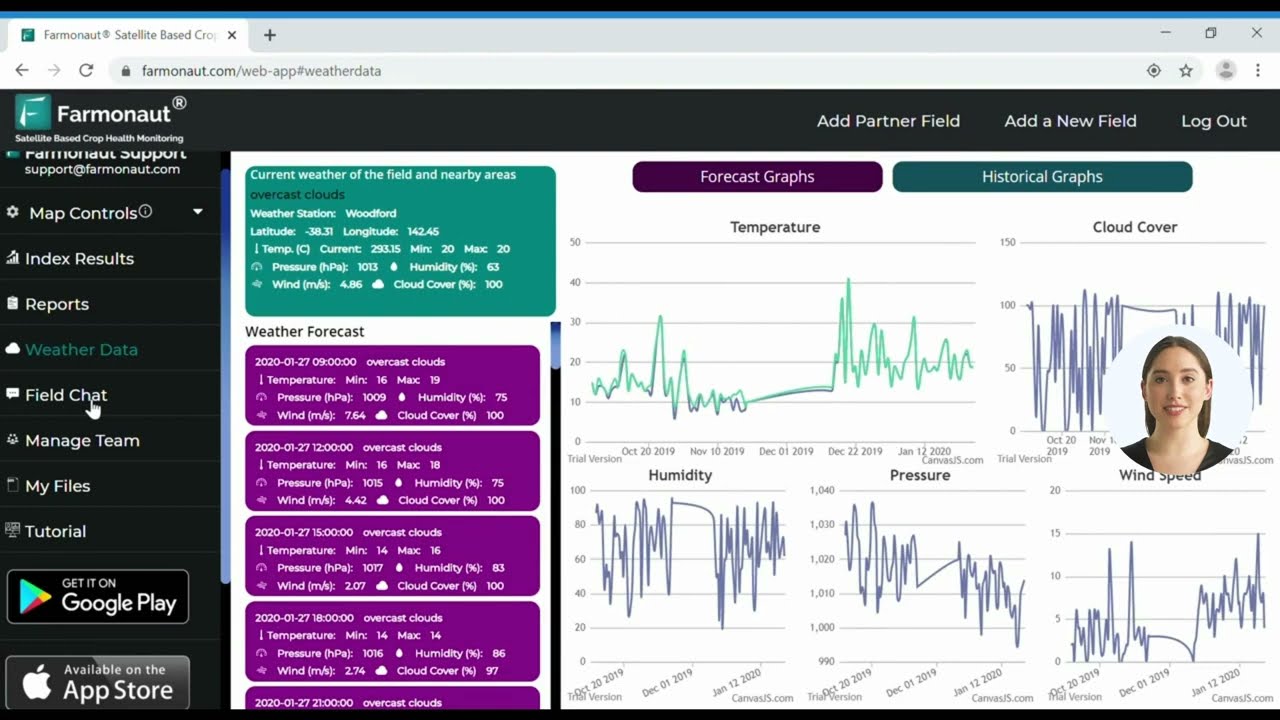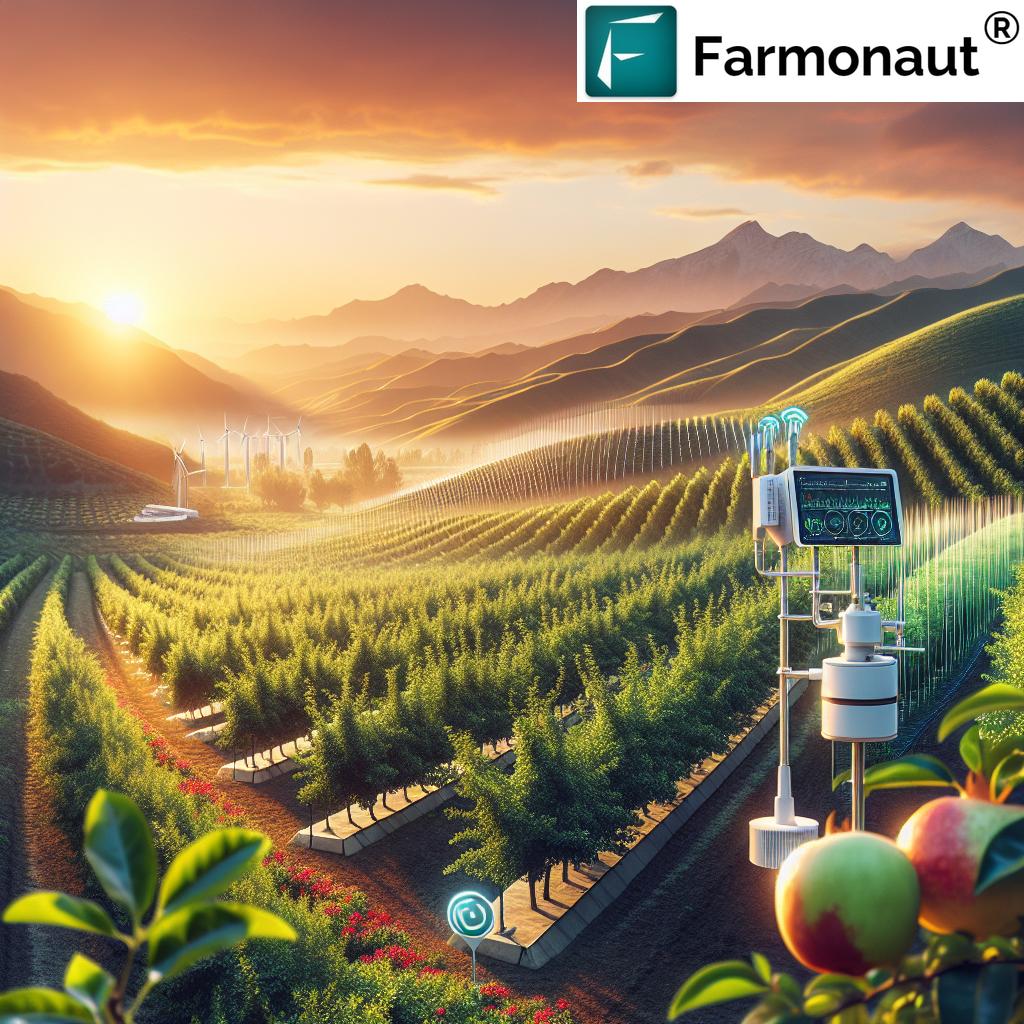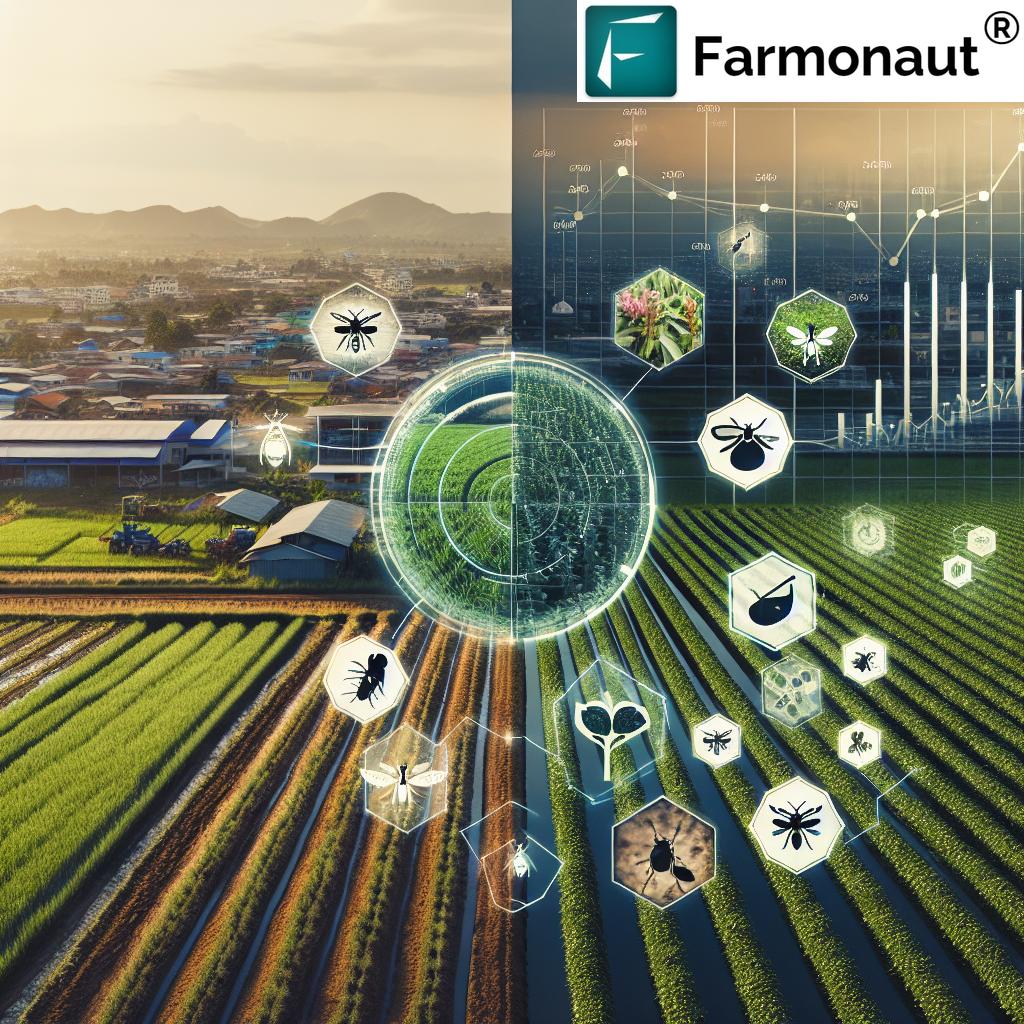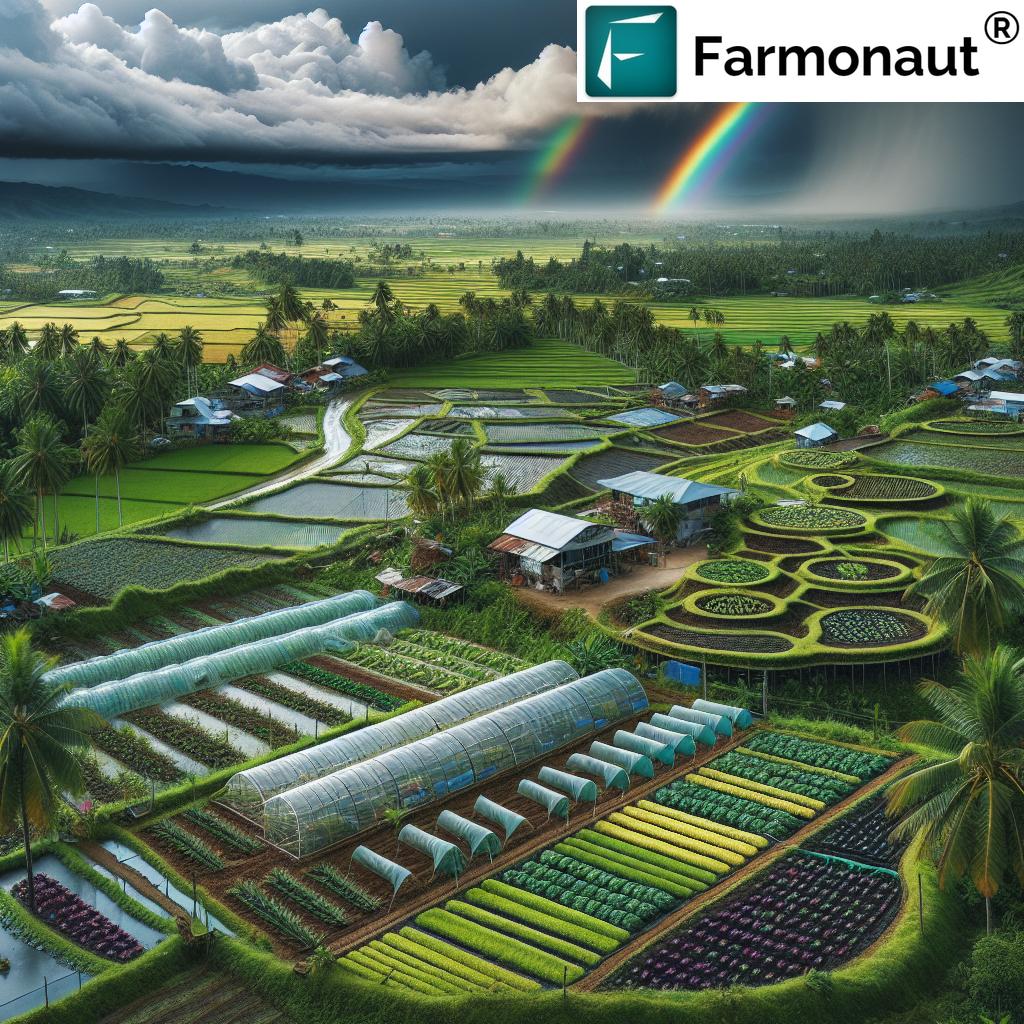Revolutionizing Indian Agriculture: How Fungicides and Precision Tech Boost Crop Yields and Farm Returns
“Fungicides can increase crop yields by up to 42% in certain conditions, significantly boosting farm returns.”
In the ever-evolving landscape of Indian agriculture, we are witnessing a remarkable transformation driven by the convergence of innovative fungicides and cutting-edge precision technologies. As we delve into this exciting realm, we’ll explore how these advancements are revolutionizing crop protection strategies and empowering farmers across the nation to optimize their yields and maximize returns.

At Farmonaut, we’re at the forefront of this agricultural revolution, offering advanced satellite-based farm management solutions that complement the use of fungicides and other crop protection products. Our mission is to make precision agriculture accessible and affordable to farmers across India and beyond.
The Rise of Fungicides in Indian Agriculture
Fungicides have emerged as a crucial tool in the arsenal of Indian farmers, playing a pivotal role in safeguarding crops against a wide array of fungal diseases. These powerful chemical compounds are designed to prevent, inhibit, or eliminate fungal growth, thereby protecting valuable crops such as wheat, rice, corn, and soybeans from devastating losses.
The importance of fungicides in Indian agriculture cannot be overstated. With the country’s diverse climatic conditions and the increasing pressure of global climate change, crops are more susceptible than ever to fungal infections. Fungicides offer a robust defense against these threats, enabling farmers to:
- Improve crop yields significantly
- Enhance the quality of produce
- Reduce post-harvest losses
- Increase farm profitability
Fungicide Benefits for Crops: A Closer Look
Let’s examine how fungicides benefit some of India’s most important crops:
1. Wheat
Fungicides play a crucial role in protecting wheat crops from diseases like rust and powdery mildew. By applying fungicides at the right time, farmers can see yield increases of up to 15-20%.
2. Rice
Rice, a staple food for millions of Indians, is susceptible to fungal diseases such as blast and sheath blight. Timely application of fungicides can boost rice yields by 10-30%, depending on disease pressure.
3. Corn
Fungal diseases like northern corn leaf blight and gray leaf spot can significantly impact corn yields. Fungicide applications have shown yield increases of 7-15% in corn crops.
4. Soybeans
Soybean farmers often face challenges from diseases like Asian soybean rust. Fungicide treatments can lead to yield improvements of 10-20% in soybeans.
These impressive results underscore the transformative potential of fungicides in Indian agriculture. However, to truly maximize the benefits of these crop protection products, farmers need to integrate them with precision agriculture technologies.
Precision Agriculture Technologies: The Game-Changer
“Precision agriculture technologies have reduced pesticide use by 30% while maintaining or improving crop yields.”
Precision agriculture technologies are revolutionizing the way Indian farmers approach crop protection and management. These innovative tools allow for more targeted and efficient use of resources, including fungicides, herbicides, and insecticides. At Farmonaut, we’re proud to be at the forefront of this agricultural revolution, offering cutting-edge solutions that empower farmers to make data-driven decisions.
Our satellite-based crop health monitoring system provides real-time insights into vegetation health, soil moisture levels, and other critical metrics. This valuable data helps farmers make informed decisions about when and where to apply fungicides and other crop protection products, optimizing their use and minimizing waste.
Key precision agriculture technologies transforming Indian farming include:
- Satellite Imagery: Provides a bird’s-eye view of crop health and stress levels across large areas.
- GPS-Guided Application: Ensures precise application of fungicides and other inputs, reducing overlap and waste.
- Variable Rate Technology (VRT): Allows for customized application rates based on specific field conditions.
- Soil Sensors: Monitor moisture levels and nutrient content, informing irrigation and fertilization decisions.
- Weather Stations: Provide localized weather data to optimize timing of fungicide applications.
By leveraging these technologies, Indian farmers can significantly enhance the effectiveness of their fungicide applications while minimizing environmental impact and reducing costs.
Integrated Pest Management: A Holistic Approach
While fungicides are a powerful tool in crop protection, they are most effective when used as part of an integrated pest management (IPM) strategy. IPM is a comprehensive approach that combines various methods to manage pests and diseases effectively while minimizing environmental impact.
Key components of an effective IPM strategy include:
- Cultural Practices: Crop rotation, proper sanitation, and resistant varieties.
- Biological Control: Utilizing natural predators and beneficial microorganisms.
- Mechanical Control: Physical barriers and traps to manage pests.
- Chemical Control: Judicious use of fungicides, herbicides, and insecticides.
- Monitoring and Scouting: Regular field inspections to detect early signs of disease or pest pressure.
By integrating precision agriculture technologies with IPM strategies, Indian farmers can achieve optimal crop protection while promoting sustainable farming practices.
Sustainable Farming Practices: Balancing Productivity and Environmental Stewardship
As we embrace the power of fungicides and precision technologies, it’s crucial to maintain a focus on sustainability. At Farmonaut, we’re committed to promoting sustainable farming practices that balance productivity with environmental stewardship.
Our platform includes features like carbon footprint tracking, which helps agribusinesses monitor and reduce their environmental impact. By providing real-time data on emissions, we enable farmers and agricultural companies to take concrete steps towards sustainability and compliance with environmental regulations.
Sustainable farming practices that complement the use of fungicides and precision technologies include:
- Conservation Tillage: Reduces soil erosion and improves soil health.
- Cover Cropping: Enhances soil fertility and suppresses weeds naturally.
- Precision Irrigation: Conserves water while optimizing crop growth.
- Integrated Nutrient Management: Balances synthetic and organic fertilizers for optimal soil health.
- Biodiversity Promotion: Encourages natural pest control and pollination.
By adopting these practices alongside judicious use of fungicides and leveraging precision agriculture technologies, Indian farmers can achieve sustainable, long-term success in their agricultural endeavors.
Weather-Resilient Farming: Adapting to Climate Challenges
One of the most significant challenges facing Indian agriculture today is the increasing unpredictability of weather patterns due to climate change. Extreme weather events, shifting monsoon patterns, and temperature fluctuations can have devastating effects on crop health and yield. This is where the combination of fungicides and precision agriculture technologies truly shines.
Farmonaut’s platform includes advanced weather forecasting capabilities, allowing farmers to anticipate and prepare for adverse weather conditions. By integrating this data with fungicide application strategies, farmers can:
- Time fungicide applications more effectively to avoid washoff from unexpected rainfall
- Adjust application rates based on humidity levels and disease pressure
- Implement preventative treatments when conditions are favorable for fungal growth
- Make informed decisions about crop varieties and planting times
This proactive approach to weather-resilient farming not only protects crops from fungal diseases but also helps stabilize commodity prices by reducing yield volatility.
Agtech Innovations: The Future of Fungicides and Crop Protection
The world of agricultural technology is constantly evolving, and exciting innovations are on the horizon for fungicides and crop protection. Some of the most promising developments include:
1. Biofungicides
These naturally derived fungicides harness beneficial microorganisms or plant extracts to combat fungal diseases. They offer an environmentally friendly alternative to synthetic fungicides and can be integrated into organic farming systems.
2. Nanotechnology-Enhanced Fungicides
By manipulating materials at the nanoscale, scientists are developing fungicides with improved efficacy and reduced environmental impact. These next-generation products promise more targeted delivery and longer-lasting protection.
3. AI-Powered Disease Prediction
Advanced machine learning algorithms are being developed to predict disease outbreaks with unprecedented accuracy. By analyzing historical data, weather patterns, and crop health indicators, these systems can alert farmers to potential threats before they become visible.
4. Drone-Based Application
Unmanned aerial vehicles (UAVs) equipped with precision sprayers are revolutionizing fungicide application. These drones can navigate difficult terrain, apply fungicides with pinpoint accuracy, and reduce overall chemical usage.
At Farmonaut, we’re excited about these innovations and are continually updating our platform to integrate new technologies as they become available. Our goal is to provide Indian farmers with the most advanced tools and insights to maximize their crop yields and returns.
Empowering Indian Farmers: The Role of Education and Training
While fungicides and precision agriculture technologies offer immense potential, their effectiveness ultimately depends on the knowledge and skills of the farmers using them. That’s why education and training are crucial components of the agricultural revolution taking place in India.
Farmonaut is committed to empowering farmers with the knowledge they need to make the most of these advanced tools. Our platform includes:
- Comprehensive tutorials on using our satellite-based crop monitoring system
- Regular webinars on the latest fungicide application techniques
- In-app notifications with timely advice on crop management
- A robust knowledge base covering a wide range of agricultural topics
By combining cutting-edge technology with ongoing education and support, we’re helping to create a new generation of tech-savvy Indian farmers who are equipped to face the challenges of 21st-century agriculture.
The Economic Impact: Boosting Farm Returns
The integration of fungicides and precision agriculture technologies isn’t just about improving crop yields – it’s about enhancing the overall economic viability of farming in India. By optimizing resource use, reducing waste, and protecting crops from devastating losses, these innovations are helping to boost farm returns significantly.
Let’s look at some of the economic benefits:
- Increased Yield Potential: As mentioned earlier, fungicides can increase crop yields by up to 42% in certain conditions.
- Reduced Input Costs: Precision application techniques can lower fungicide usage by 15-30%, translating to significant cost savings.
- Improved Crop Quality: Better disease control often results in higher-grade produce that commands premium prices in the market.
- Risk Mitigation: Advanced weather forecasting and disease prediction help farmers avoid catastrophic losses.
- Access to New Markets: Improved crop quality and traceability (through blockchain technology) can open doors to lucrative export markets.
These economic benefits are not just theoretical. Across India, farmers who have adopted these technologies are reporting substantial improvements in their bottom line. This increased profitability is crucial for the long-term sustainability of Indian agriculture, allowing farmers to reinvest in their operations and adopt even more advanced technologies.
Comparison: Traditional vs. Precision Agriculture Fungicide Application
| Application Method | Efficiency (%) | Crop Yield Increase (%) | Cost Savings (%) | Environmental Impact |
|---|---|---|---|---|
| Blanket Spraying | 60 | 10-15 | 0 | High |
| Spot Treatment | 75 | 15-20 | 10-15 | Medium |
| Drone Application | 85 | 20-25 | 20-25 | Low |
| Sensor-based Variable Rate Application | 90 | 25-30 | 25-30 | Low |
| AI-powered Predictive Application | 95 | 30-35 | 30-35 | Low |
This table clearly illustrates the significant advantages of precision agriculture techniques in fungicide application. The progression from traditional blanket spraying to AI-powered predictive application shows marked improvements in efficiency, crop yield increases, and cost savings, all while reducing environmental impact.
The Global Context: India’s Role in Sustainable Agriculture
As we discuss the revolution in Indian agriculture, it’s important to consider the global context. India, as one of the world’s largest agricultural producers, has a significant role to play in addressing global food security challenges while promoting sustainable farming practices.
The adoption of advanced fungicides and precision agriculture technologies positions India as a leader in sustainable intensification – the practice of increasing agricultural productivity while minimizing environmental impact. This approach is crucial as the world grapples with the dual challenges of feeding a growing population and mitigating climate change.
By leveraging these technologies, Indian agriculture can:
- Contribute to global food security by increasing crop yields
- Reduce the environmental footprint of farming through more efficient resource use
- Serve as a model for other developing nations seeking to modernize their agricultural sectors
- Attract international investment in agtech innovation
At Farmonaut, we’re proud to be part of this global movement towards more sustainable and productive agriculture. Our platform not only serves Indian farmers but is designed to be adaptable to agricultural contexts around the world.
The Road Ahead: Challenges and Opportunities
While the future of Indian agriculture looks bright, there are still challenges to overcome in the widespread adoption of fungicides and precision agriculture technologies. Some of the key hurdles include:
- Infrastructure Gaps: Reliable internet connectivity and electricity supply are essential for many precision agriculture tools.
- Initial Investment Costs: While these technologies offer long-term savings, the upfront costs can be prohibitive for some farmers.
- Skill Gap: Many farmers need training to effectively use and interpret data from advanced agricultural technologies.
- Regulatory Framework: Policies need to keep pace with technological advancements to ensure safe and responsible use of new fungicides and application methods.
However, these challenges also present opportunities for innovation and growth. At Farmonaut, we’re constantly working to make our technologies more accessible, user-friendly, and affordable. We’re also advocating for supportive policies and collaborating with educational institutions to bridge the knowledge gap.
Conclusion: A Brighter Future for Indian Agriculture
The convergence of advanced fungicides and precision agriculture technologies is ushering in a new era for Indian agriculture. By embracing these innovations, farmers across the country are poised to achieve higher yields, improved crop quality, and greater profitability – all while promoting sustainable farming practices.
At Farmonaut, we’re excited to be at the forefront of this agricultural revolution. Our satellite-based farm management solutions, combined with AI-driven insights and blockchain traceability, provide farmers with the tools they need to thrive in this new landscape.
As we look to the future, we see endless possibilities for Indian agriculture. From AI-powered disease prediction to drone-based fungicide application, the innovations on the horizon promise to make farming more efficient, productive, and environmentally friendly than ever before.
We invite you to join us on this exciting journey. Whether you’re a small-scale farmer looking to optimize your operations or a large agribusiness seeking to implement cutting-edge technologies, Farmonaut has the solutions to help you succeed in the ever-evolving world of agriculture.
Together, we can build a more sustainable, productive, and prosperous future for Indian agriculture – one crop at a time.
FAQ Section
Q1: What are the main benefits of using fungicides in agriculture?
A1: Fungicides offer several key benefits, including increased crop yields, improved produce quality, reduced post-harvest losses, and enhanced farm profitability. They protect crops from devastating fungal diseases that can significantly impact agricultural output.
Q2: How do precision agriculture technologies complement fungicide use?
A2: Precision agriculture technologies enable more targeted and efficient use of fungicides. They provide real-time data on crop health, soil conditions, and weather patterns, allowing farmers to make informed decisions about when and where to apply fungicides, optimizing their effectiveness while minimizing waste.
Q3: What is integrated pest management (IPM), and how does it relate to fungicide use?
A3: Integrated pest management is a holistic approach to pest and disease control that combines various methods, including cultural practices, biological control, and judicious use of chemical controls like fungicides. IPM aims to manage pests and diseases effectively while minimizing environmental impact.
Q4: How can farmers ensure they’re using fungicides sustainably?
A4: Sustainable fungicide use involves several practices:
- Using precision agriculture technologies for targeted application
- Rotating fungicides to prevent resistance development
- Integrating fungicides into a broader IPM strategy
- Following recommended application rates and timing
- Monitoring crop health regularly to avoid unnecessary applications
Q5: What role does Farmonaut play in improving fungicide use and crop protection?
A5: Farmonaut provides advanced satellite-based farm management solutions that complement fungicide use. Our platform offers real-time crop health monitoring, AI-driven insights, and weather forecasting capabilities. This helps farmers make informed decisions about fungicide application, optimizing their use while promoting sustainable farming practices.
Explore Farmonaut’s Solutions:
For developers interested in integrating our satellite and weather data:
Farmonaut API
API Developer Docs
Download our mobile apps:




















